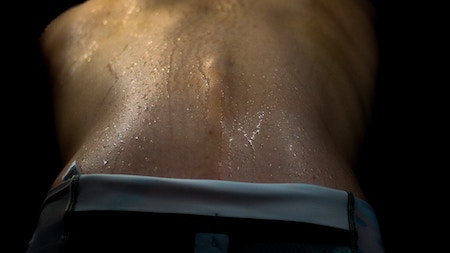
Updated October 2023
Many of our clients at Harley Street MD Aesthetic Clinic in London ask us, “Why am I sweating so much?’ Everyone sweats, and it is an essential function to regulate body temperature, but if you are struggling with sweating for no reason, there are various ways to treat the condition.
But before having any treatments, it’s important to visit your doctor to find out if there are any underlying causes of excessive sweating. Once you have ruled out any health conditions (we will cover these later in the post) that could require treatment, there are a few options.
Excessive sweating can be frustrating and challenging to live with, and body odour can impact how confident you feel in your professional and personal life. No matter what you do, you should be able to live your best life, and a sweating problem is the last thing that should be holding you back.
This article will cover the possible causes of excessive sweating, the treatments, and what you can expect from each option.
Excessive sweating is known as hyperhidrosis, and it’s a result of overactive sweat glands. Often underestimated as a relatively minor issue, it can cause skin problems, make you feel embarrassed, and destroy your self-confidence. And, yet, treatment for hyperhidrosis can be extremely effective.
You may notice you’re sweating even when you have recently showered and applied deodorant. Or you may always have sweaty hands or sweat patches under your arms that show through your clothes. There are external reasons for the causes of excessive sweating, but in most cases, it is simply down to a malfunction of the nerves that trigger sweat glands to release sweat. Hyperhidrosis can affect the whole body, known as secondary hyperhidrosis. This often causes night sweats due to an actual medical or health condition.
Consulting with your doctor is critical if you are experiencing secondary hyperhidrosis, which can be a result of many underlying conditions, including:
Certain medications can also be a cause of secondary hyperhidrosis. If you have recently started taking a new medication or antibiotics and you are sweating for no reason, speak to your healthcare provider. Medications associated with excessive sweating include:
The other reason for excessive sweating is called primary focal hyperhidrosis, which tends to cause sweating of the hands, underarms, feet, or face. Common external triggers that can cause primary focal hyperhidrosis include:
Sweating when you’re anxious or stressed is very normal. Anxiety sweating results from adrenaline, cortisol, and other stress chemicals, which are released when the brain responds to an implied danger when you are experiencing stress.
If you notice you sweat when you are nervous or anxious, there are a few things you can try:
Before trying medical treatment for excessive sweating, you might want to consider trying some homemade natural deodorants. Here are our top three:
All of these natural deodorants will be more effective if you use them daily. You may not notice a difference in how much you sweat initially, but keep using them for three to five days, and you should start to notice a difference.
Various treatments approved by the USA Food and Drug Administration (FDA) and the UK Medicines and Healthcare Products Regulatory Agency (MHRA) can help to reduce and prevent excessive sweating. These include:
This simple treatment consists of individually wrapped prescription cloth deodorant wipes, which contain glycopyrronium tosylate. Your GP can prescribe these, and you simply wipe them under your arms once a day in the morning.
However, side effects of glycopyrronium wipes include:
Prescription medications that are taken orally can reduce the stimulation of sweat glands. Medication for excessive sweating is usually only recommended after other treatments have proved to be unsuccessful.
Common types of anticholinergics hyperhidrosis medications for treating excessive sweating include:
These medicines are unsuitable if you do a lot of physical exercise or live in a hot climate, as they prevent the body from sweating and can lead to overheating.
Anticholinergics are also not suitable if you have:
Side effects from prescription medications for the treatment of excessive sweating include:
Botox is an incredibly effective alternative treatment for excessive sweating. It is often the preferred treatment as you do not have the risk of side effects caused by medication for hyperhidrosis.
Approved by the NHS and the Food and Drug Administration (FDA) for treating excessive sweating, Botox treatment is very safe and long-lasting. Botox is a neurotoxin and works by blocking the chemical that sends “sweat signals” to the brain to activate sweating.
If you have tried many types of deodorant or other solutions without success and want to avoid the potential side effects of medication, Botox might be the solution to your sweating problem. Body areas that can be treated with Botox injections for sweating are:
1 Are Botox injections for sweating painful?
Many people are nervous about having injections and are worried it will be painful. Although we can’t tell you it is completely painless, most people find it is not nearly as bad as they expected. The needles are extremely fine and do not go deep into the skin. Most of our clients tell us that the injections are not painful at all.
2. How long does Botox treatment for sweating take?
Depending on how many areas you want to have treated with Botox, the treatment will generally take between 20 to 30 minutes.
3. How fast are the results after Botox treatment for sweating?
Most people see results three to five days after Botox treatment for hyperhidrosis (excessive sweating). It can be an incredible cure for a sweating problem, and you’ll instantly feel more confident and comfortable.
4. How long does Botox treatment for sweating last?
The results of Botox treatment for hyperhidrosis generally last between five and nine months, depending on how your body processes the drug and sometimes your skin type.
An initial consultation at Harley Street MD in London is obligation-free, and it costs nothing. If you want to talk to us about Botox injections to treat excessive sweating, contact us today and finally regain your confidence.







